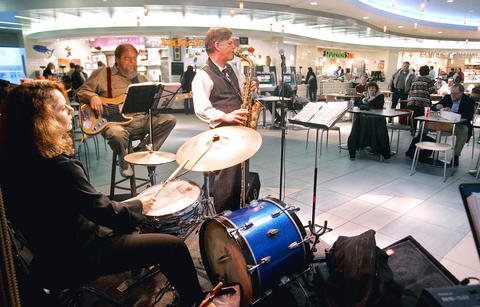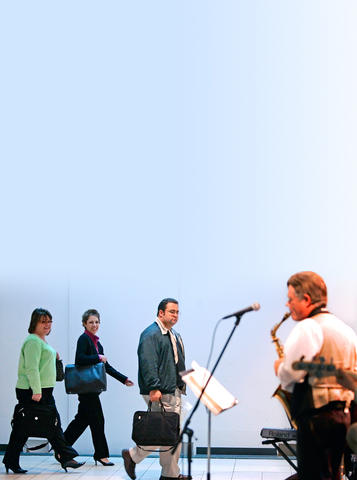Members of the audience dash off suddenly during his show. Others talk on cellphones, read novels or wolf down sandwiches.
John Bontempi takes it all in stride. He strums his guitar and sings another tune near the clanking baggage carousel at Nashville International Airport.
"It took all of history just to make you mine," he warbles from under a dark cowboy hat.

PHOTO: AP
Bontempi is among the 90 or so professional musicians who perform at the airport in its push to add "local flavor," a break from the chain gift shops and restaurants in American airports from Miami, Florida, to Seattle, Washington.
"We're the best gig in town," proclaimed Cathy Holland, the airport's director of community affairs and customer service.
The musicians tend to agree, even if the audience is antsy and the overhead announcements - "The local time is 2:30pm" - get annoying.

PHOTO: AP
"It's a lot of fun. You get a lot of different people coming through," says Bontempi, a singer-songwriter who plays all original material at his monthly two-hour airport shows. "I've had people on their cellphones walk by and say 'Hey, they even have music here - listen' and they hold up their cellphone." Nashville already has one of the busiest airports in the US for live music, but this month it will liven up even more with the opening of Tootsie's, an offshoot of the Tootsie's Orchid Lounge honky-tonk where Willie Nelson and Kris Kristofferson once swapped songs and cold beers.
No one knows for certain, but Nashville International and Austin-Bergstrom International Airport in Texas probably have more live music than any other airport in the US, according to the trade group Airports Council International.
The cities share a rich musical heritage. Nashville's reputation as the capital of country music goes back to the start of the Grand Ole Opry in the 1920s. Austin's thriving independent music scene grew from country roots in the 1970s and is celebrated by thousands of music industry representatives and fans who flock to the annual South By Southwest Festival.
"The airport is the gateway. It's important that it reflect the culture and character of the city," said Jim Halbrook, spokesman for Austin's airport, where a variety of musical acts do 11 shows a week.
Other North American airports have live music on a more limited basis. During the holidays, Boston Logan International and Vancouver International had professional performers and local school choirs.
Lambert-St Louis International has musicians playing a few times a week. Fort Lauderdale Hollywood International in Florida has live entertainment during the fall and winter months.
In Nashville, the airport began offering music in the early 1990s as country music was hitting a growth spurt. Today, musicians of every stripe play its five stages most days of the week.
On the same afternoon Bontempi sang his country songs in baggage claim, a four-piece pop group called the Chessmen performed near the security gate. A handful of people sat at the bar, a few worked at laptops or watched ESPN. When the band broke into Jimmy Buffett's beach anthem Margaritaville, everyone clapped.
"It's a nice touch," remarked Julie Wyte from Alabama. "My husband has been in the military for 20 years and we've been to airports all over the world, and I don't think I've ever seen that before."
Airports across the nation are trying to mirror their cities. At Las Vegas' McCarran International Airport, travelers can play the slot machines. At San Francisco International, they can tour an aquarium. At Palm Beach International in Florida, they can practice their putting.
The airports, in effect, are marketing tools. "The citizens who use them feel at home, and the visitors coming in get a sense of the city without leaving the airport," said Eileen Denne, spokeswoman for Airports Council International.
Nashville's niche has long been its music. From the vintage concert posters on the walls to the guitars and banjos in glass cases, there's no mistaking the airport for any other.
With the opening of Tootsie's - actually, two of them, one in the public area and one in the secure area - travelers can get a feel for the gritty downtown dive where country singers past and present got their starts.
But while the new airport clubs have the same live music and decor as the original, don't expect the same rough edges, like beer-soaked floors and walls covered with graffiti and faded stars' portraits.
"You've got to get that with age. You get that with hard knocks," owner Steve Smith said.
Still, for singers and musicians like Bontempi, the airport remains a sweet gig. For one thing, it pays - US$32.50 per hour for the side musicians, US$65 per hour for the frontman. Not bad in a town so crammed with people trying to get discovered that they'll play for free.
And while the audience is far from rapt, they can be appreciative.
As Bontempi performed, a stocky guy with a beard walked by once, twice and a third time before finally setting down his bags and fixing his attention on the tiny stage.
The man, a 28-year-old welder from Sacramento, California, named Keith Branson, smiled and nodded with the music.
"At least now I can say I heard a country singer in Nashville," he said.

Dissident artist Ai Weiwei’s (艾未未) famous return to the People’s Republic of China (PRC) has been overshadowed by the astonishing news of the latest arrests of senior military figures for “corruption,” but it is an interesting piece of news in its own right, though more for what Ai does not understand than for what he does. Ai simply lacks the reflective understanding that the loneliness and isolation he imagines are “European” are simply the joys of life as an expat. That goes both ways: “I love Taiwan!” say many still wet-behind-the-ears expats here, not realizing what they love is being an

Every now and then, even hardcore hikers like to sleep in, leave the heavy gear at home and just enjoy a relaxed half-day stroll in the mountains: no cold, no steep uphills, no pressure to walk a certain distance in a day. In the winter, the mild climate and lower elevations of the forests in Taiwan’s far south offer a number of easy escapes like this. A prime example is the river above Mudan Reservoir (牡丹水庫): with shallow water, gentle current, abundant wildlife and a complete lack of tourists, this walk is accessible to nearly everyone but still feels quite remote.

It’s a bold filmmaking choice to have a countdown clock on the screen for most of your movie. In the best-case scenario for a movie like Mercy, in which a Los Angeles detective has to prove his innocence to an artificial intelligence judge within said time limit, it heightens the tension. Who hasn’t gotten sweaty palms in, say, a Mission: Impossible movie when the bomb is ticking down and Tom Cruise still hasn’t cleared the building? Why not just extend it for the duration? Perhaps in a better movie it might have worked. Sadly in Mercy, it’s an ever-present reminder of just

Google unveiled an artificial intelligence tool Wednesday that its scientists said would help unravel the mysteries of the human genome — and could one day lead to new treatments for diseases. The deep learning model AlphaGenome was hailed by outside researchers as a “breakthrough” that would let scientists study and even simulate the roots of difficult-to-treat genetic diseases. While the first complete map of the human genome in 2003 “gave us the book of life, reading it remained a challenge,” Pushmeet Kohli, vice president of research at Google DeepMind, told journalists. “We have the text,” he said, which is a sequence of